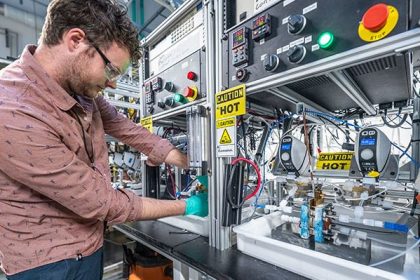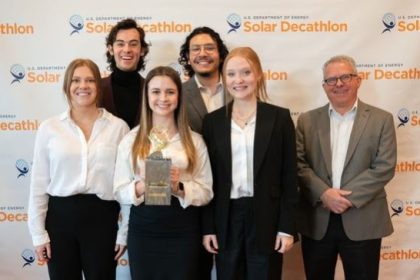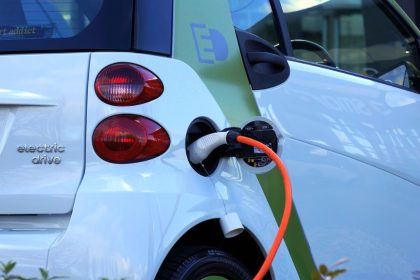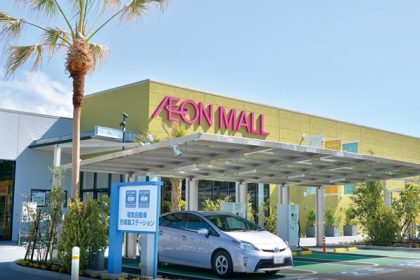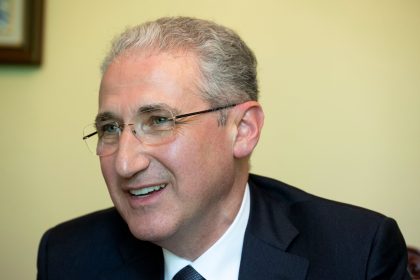Tyson Tells ARPA-E: Innovation Comes Faster Than Most Think
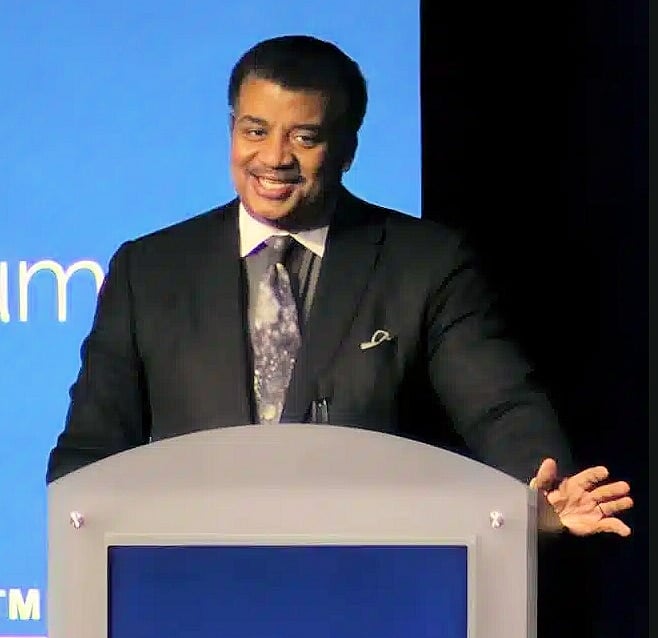
NATIONAL HARBOR, Md. — Despite all the descriptors you could put in front of his name — astrophysicist, director of the Hayden Planetarium in New York, graduate of Harvard, with a Ph.D. from Columbia, author and celebrated scientist, TV star — Dr. Neil deGrasse Tyson had no qualms admitting he was little more than a cheerleader when it came to his attendance at last week’s ARPA-E Energy Innovation Summit.
He had, after all, been invited by Evelyn Wang, director of the federal agency that gives the summit its name, to offer “a slightly different perspective” on the topic of energy.
In a large room temporarily populated by scientists, researchers and entrepreneurs for whom a laser-like focus on the minute qualities of very specific things is a life’s work, Tyson offered a more universal perspective.
In fact, after breezily touching on a series of theories involving energy capture from stars near and far, culminating in physicist Freeman Dyson’s sphere, a hypothetical megastructure intended to capture a tremendously large percentage of the sun’s energy output — Tyson obviously knew his audience — the ebullient holder of 23 honorary doctorates was suddenly talking about plain old salt.
“There was a day, not so long ago, 150 years ago, when salt was a strategic asset,” he said. “And I know what you’re thinking, you’re thinking, ‘Strategic? Why?’
“Well, because before we had electricity and machines and appliances, one of the only ways you could preserve your food and survive from the fall harvest to spring, was to salt it,” he continued, “Today, salt is just a flavor thing; not so long ago, your survival depended on it.
“And that’s the reason General Grant bombed the salt reserves of the Confederacy during the Civil War, to limit its ability to fight over the winter months,” he said.
Tyson went on to explain that as the industrial revolution followed on the heels of the war, advances in transportation — the railroad, especially — dramatically reduced the time between production and consumption, and the harnessing of electricity enabled people to have iceboxes, refrigerators and freezers.
“Suddenly, there were 22 different ways to preserve foods and one of the results was that salt was no longer a strategic asset. It was just one way to accomplish something,” he said, adding that he sees much the same transition occurring in the energy sector today.
“You know, I look at my wall socket, and know electricity comes out of it, and that’s a remarkable fact, and I know that if I could follow the electrical wires back to the power plant creating my electricity, I’d probably find that it’s still being created by coal. Eighty percent of our power is still made by coal.
“But we’re at a point when we’re becoming less coal-dependent. My electric car doesn’t run on coal, it runs from energy that came out of the wall socket, but is now stored in a battery.
“And as for the energy coming into my home, if coal is not working out, it’s nearing the point where you can choose another way … it could be hydro, it could be wind, it could be solar. It could be one of the currently hidden inventions coming out of conferences like this one,” he said.
As in the case of society replacing salt, Tyson went on to say he doesn’t see the future of energy as a zero-sum game.
“While I’m not a betting person, the future, I think, [that’s] coming is one in which we’ll have multiple ways to create electricity and we’ll be able to choose those sources that best serve us by region and temperament,” he said. “And so, you’ll always have places where fossil fuels can compete to be the local source of power … while geothermal or hydropower might work better in another part of the country.
“I mean, there are people — we all know at least one of them, probably — who have four different kinds of salt in their pantry. Why can’t a country in which there are 20 different ways of making energy, rely on regionally different mixes based on the economy and will of the citizenry? A similar thing happened with salt. No one system of preserving food emerged and replaced all others.”
Tyson then went on to discuss the pace of change, a subject particularly dear to the hearts of the entrepreneurs and business people in the room.
“What I’ll tell you without hesitation is that what history shows us is that when a culture embraces change, it does so because it is ready culturally, politically and especially economically,” he said. “And when that happens, change comes down on us very quickly, like an avalanche.
“For example, in 1903, the Wright Brothers made the first powered flight at Kitty Hawk, North Carolina, but even Orville Wright remained skeptical of their invention. In 1910 he told a reporter that while the airplane might someday be useful for short passenger flights, it would never be able to take large numbers of people across the Atlantic Ocean,” Tyson said.
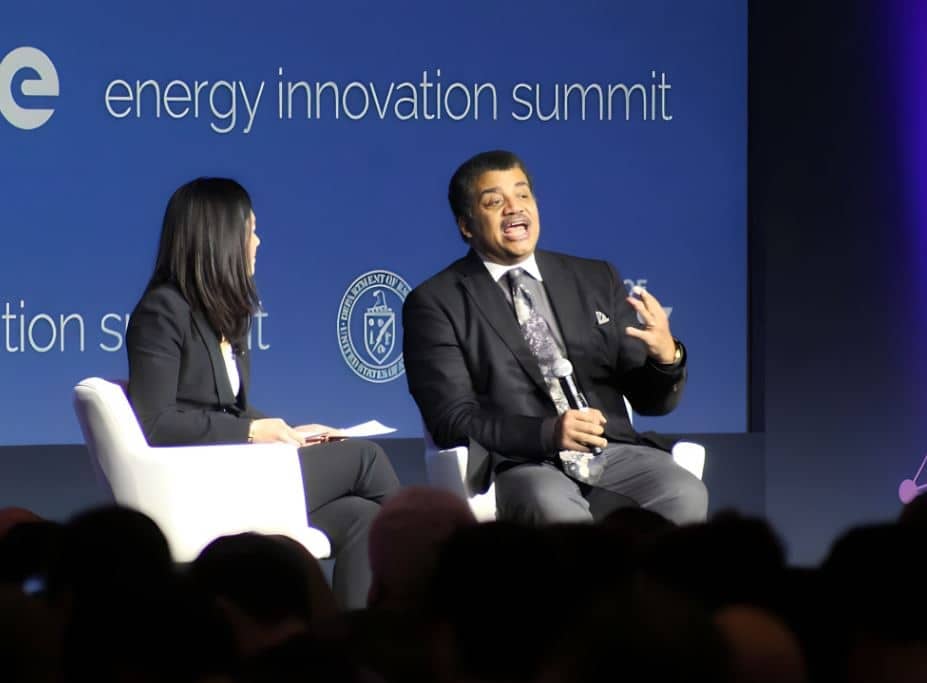
“And in 1957, just 54 years after the Wright Brothers flight, less than a lifetime, the Boeing 707, the first successful commercial passenger jetliner, made its debut,” he said.
But Tyson went on to explain that short-sightedness when it came to predicting the future of innovation was not limited to Orville Wright.
He next pointed to a special edition of the Brooklyn Daily Eagle newspaper marking the arrival of the 20th century. In it, all manner of people were asked to predict what the world would be like at the start of the 21st century. In every single instance, the predictions proved wrong.
These included one offered by an executive with the New York Central Railroad, who said he could “scarcely” see the advances in transportation in the 20th century being anywhere near as great as those of the 19th century.
“That was probably one of the most boneheaded statements ever made by anybody,” Tyson said.
“Now, let’s say 54 years is not fast enough for you in terms of the pace of innovation, and let’s keep our friend from the railroad in mind,” he continued.
Calling up a slide, which was shown on a large screen on either side of the stage, Tyson explained that the large black-and-white photograph being displayed showed the New York City Easter Parade from 1900.
“Now look closely,” he said.
Closer inspection revealed that all but one of the “vehicles” crowding New York’s Fifth Avenue, were horse-drawn buggies. Only one car was in sight.
A second slide showed the same holiday scene in 1913, when all but one of the vehicles was a car, and only one horse-drawn buggy could be seen.
“So again, when the culture, the politics and the economics align, the pace of commercialization of innovation can go very quickly,” Tyson said. “And I’ll make a prediction here today, if only so that I can be made a fool of by people who come after me — by 2050, 100% of the cars on the road will be self-driving electric vehicles.”
The statement caused a stir in the audience, but the scientist was unbowed.
“Think about it,” Tyson said. “A self-driving car will never drive drunk. It will never drive while putting on makeup. It’s not texting — well, actually, it could be texting, but that wouldn’t affect its performance. … In the past year, we lost 40,000 people to highway automobile accidents. And we just live with that. That’s an entire Vietnam’s worth of dead Americans every year on our roads. So, a world of self-driving electric vehicles? I want to be ready for that.”
Tyson next turned to the subject of risk, applauding the Advanced Research Project Agency for Energy for helping so many scientists and researchers reduce their exposure to it.
But he said at the same time, reducing risk isn’t the same thing as eliminating failure, and suggested failure is not just a necessary part of the scientific process, but actually something of an attribute.
“When I was doing my post-doc work at Princeton, I had a professor of astronomy named Martin Schwarzschild, who said, ‘The day you stop making mistakes, is the day you can be sure you are no longer on the frontier.’ And I’ve never forgotten that. Now, a mistake in the context he was talking about was the same as a failed experiment, and you know, the rate of failed experiments can be pretty high — 80%, perhaps — and you shouldn’t be stigmatized by that.”
“Thank you for that,” Wang said. “That’s a really helpful perspective. And indeed we do take a lot of risk at ARPA-E and we do expect pretty high failure rates. But that’s how we push forward innovation.”
“You know, there’s an old saying in the rocket community, that there’s nothing more interesting to look at than when a rocket explodes — provided, of course, that there are no people on it,” Tyson said. “The rocket scientist will say, ‘that explosion wasn’t a failure, it was an experiment rich with data.’”
Dan can be reached at [email protected] and at https://twitter.com/DanMcCue

















